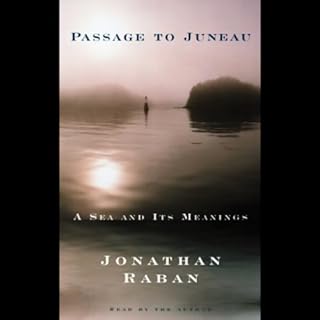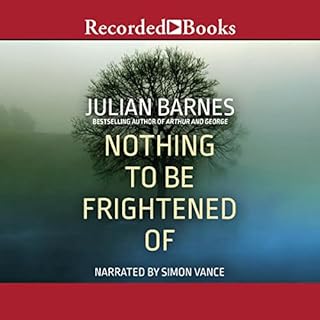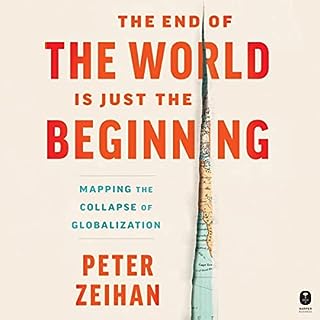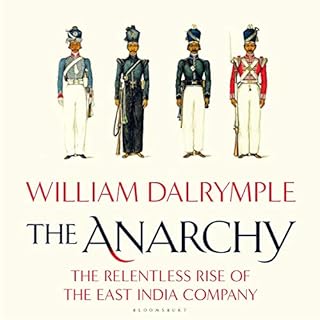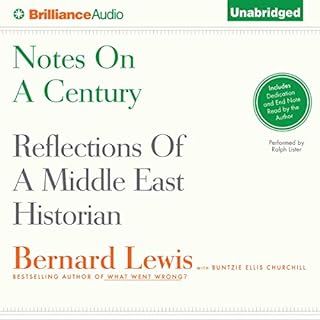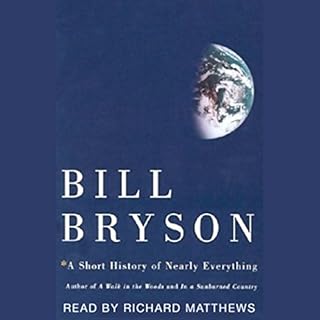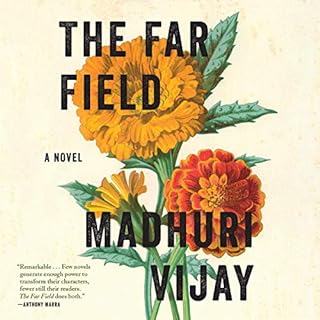jon orourke
- 25
- opiniones
- 54
- votos útiles
- 84
- calificaciones
-
Passage to Juneau
- A Sea and Its Meanings
- De: Jonathan Raban
- Narrado por: Jonathan Raban
- Duración: 3 h
- Versión resumida
-
General4 out of 5 stars 53
-
Narración:4.5 out of 5 stars 41
-
Historia3.5 out of 5 stars 41
Acclaimed travel writer Jonathan Raban invites us aboard his boat, a floating cottage cluttered with books, curling manuscripts, and dead ballpoint pens. He's about to sail alone from Seattle to the Alaskan Panhandle, following an ancient sea route rich in history, riddles, and whirlpools. It's the perfect setting for Raban's prodigious intellect, eloquence, and eye for detail.
-
5 out of 5 stars
-
More Please
- De Tyler Tanner en 08-03-16
- Passage to Juneau
- A Sea and Its Meanings
- De: Jonathan Raban
- Narrado por: Jonathan Raban
A Masterpiece of Travel Writing
Revisado: 02-16-24
I read, or rather listened to this masterpiece because Paul Theroux, whom I greatly admire, recommended Rabin his favorite travel writer. Pretty hard to find a higher compliment.
Raban himself narrates/performs this piece, and he is really the perfect narrator. [Some of Raban's other 'audible' works are narrated by so-called 'professionals', but these professionals are not nearly as good as Raban himself.]
This is perfect travel writing on several levels. I cannot think how it could be improved. The story of his own solo sail up the US-Canadian west coast, from Seattle to Juneau is juxtaposed with his accurate and fascinating recounting of a similar trip by the 18th century British explorer, George Vancouver. It ends with a very sad Raban family tragedy.
Great literature, and particularly engaging for those who enjoy sailing and the sea ... just very good literature. A masterpiece in my book..
Se ha producido un error. Vuelve a intentarlo dentro de unos minutos.
Has calificado esta reseña.
Reportaste esta reseña
-
Nothing to Be Frightened Of
- De: Julian Barnes
- Narrado por: Simon Vance
- Duración: 9 h y 9 m
- Versión completa
-
General4.5 out of 5 stars 27
-
Narración:5 out of 5 stars 22
-
Historia4.5 out of 5 stars 22
A memoir on mortality as only Julian Barnes can write it, one that touches on faith and science and family as well as a rich array of exemplary figures who over the centuries have confronted the same questions he now poses about the most basic fact of life: its inevitable extinction.
-
5 out of 5 stars
-
Brilliant
- De Mitzi en 09-01-23
- Nothing to Be Frightened Of
- De: Julian Barnes
- Narrado por: Simon Vance
Excellent
Revisado: 11-06-23
Excellent meditation on mortality. I highly recommend it for all readers. It is interesting, thought-provoking and humorous in parts.
Se ha producido un error. Vuelve a intentarlo dentro de unos minutos.
Has calificado esta reseña.
Reportaste esta reseña
-
The Making of the Atomic Bomb
- 25th Anniversary Edition
- De: Richard Rhodes
- Narrado por: Holter Graham
- Duración: 37 h y 16 m
- Versión completa
-
General4.5 out of 5 stars 4,078
-
Narración:4.5 out of 5 stars 3,638
-
Historia4.5 out of 5 stars 3,616
Here for the first time, in rich human, political, and scientific detail, is the complete story of how the bomb was developed, from the turn-of-the-century discovery of the vast energy locked inside the atom to the dropping of the first bombs on Japan. Few great discoveries have evolved so swiftly - or have been so misunderstood. From the theoretical discussions of nuclear energy to the bright glare of Trinity, there was a span of hardly more than 25 years.
-
3 out of 5 stars
-
Beware limitations of the reader
- De JFanson en 01-01-19
- The Making of the Atomic Bomb
- 25th Anniversary Edition
- De: Richard Rhodes
- Narrado por: Holter Graham
Excellent Introduction the story of the bomb
Revisado: 09-10-23
On the advice of a friend who thought the new movie "Oppenheimer" did not provide a proper, full, "in-context". description of the US government's Manhattan Project, I read/listened to Rhodes' massive effort that was first published in 1986. I'm glad that I took his advice. It is an excellent and enjoyable introduction to the topic .
On the downside, I'd had a feeling throughout that the author did not really understand deeply nuclear physics, because some of his explanations seemed incomplete. Likewise, when he tries to describe the mechanisms used by scientists to discover nuclear fission and fusion, and to manufacture the needed materials, those descriptions seemed inadequate to the task. They may have been technically correct [as I am sure they were made so by editors before publishing], but even after reading such descriptions several times I was still left with an unclear picture of what he was trying to describe. I guess I was hoping for the clarity that, for example, Richard Feynman brings to the subject of the mechanics of nuclear physics.
The narrator was/is excellent IMHO
Se ha producido un error. Vuelve a intentarlo dentro de unos minutos.
Has calificado esta reseña.
Reportaste esta reseña
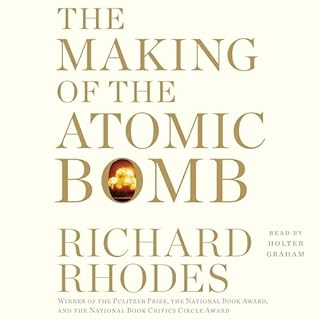
-
The Making of the Atomic Bomb Part 4
- 25th Anniversary Edition
- De: Richard Rhodes
- Narrado por: Holter Graham
- Duración: 9 h y 23 m
- Versión completa
-
General5 out of 5 stars 4
-
Narración:5 out of 5 stars 4
-
Historia5 out of 5 stars 4
Here for the first time, in rich human, political, and scientific detail, is the complete story of how the bomb was developed, from the turn-of-the-century discovery of the vast energy locked inside the atom to the dropping of the first bombs on Japan. Few great discoveries have evolved so swiftly - or have been so misunderstood. From the theoretical discussions of nuclear energy to the bright glare of Trinity, there was a span of hardly more than 25 years.
-
5 out of 5 stars
-
Excellent! Better than the movie, by far!!
- De jon orourke en 08-31-23
- The Making of the Atomic Bomb Part 4
- 25th Anniversary Edition
- De: Richard Rhodes
- Narrado por: Holter Graham
Excellent! Better than the movie, by far!!
Revisado: 08-31-23
Excellent… better than the movie. by far … book provides more substance and focuses on the right ethical and political issues and concerns.
Se ha producido un error. Vuelve a intentarlo dentro de unos minutos.
Has calificado esta reseña.
Reportaste esta reseña
-
The End of the World Is Just the Beginning
- Mapping the Collapse of Globalization
- De: Peter Zeihan
- Narrado por: Peter Zeihan
- Duración: 16 h y 44 m
- Versión completa
-
General4.5 out of 5 stars 6,200
-
Narración:5 out of 5 stars 5,324
-
Historia5 out of 5 stars 5,287
For generations, everything has been getting faster, better, and cheaper. Finally, we reached the point that almost anything you could ever want could be sent to your home within days - even hours - of when you decided you wanted it. America made that happen, but now America has lost interest in keeping it going.
-
3 out of 5 stars
-
Everyone dies except Americans
- De preetam en 06-22-22
- The End of the World Is Just the Beginning
- Mapping the Collapse of Globalization
- De: Peter Zeihan
- Narrado por: Peter Zeihan
Informed, Well-Researched Take on Global Economy
Revisado: 12-05-22
Niels Bohr once said, "“Prediction is very difficult, especially if it's about the future."
So true, especially when trying to predict the shape and nature of the entire global economy decades into the future. But Peter Zeihan, who often briefs at the CIA, gives it a try and IMHO does an excellent job.
If you are not sure whether you want to invest in, and commit to this 16 hour listen, first go to the Wikipedia entry for this book, scroll down to the bottom of the Wikipedia page and click on the color graphs in Zeihan's excellent book. These illustrations are very clear, and in a few minutes you will have a good sense of the scope, contents and key points of the book.
The whole effort is well-researched, and the author and his team have compiled an enormous amount of useful data and presented it well. I don't agree with many predictions, but found the whole enchilada both informative and entertaining.
The author himself narrates and "performs' the Audible book, but I thought his performance was below par at times. He often over-dramatizes his voice, adding unnecessary inflections and emphasis to underscore his point. Not necessary: just speak clearly and distinctly and let the words and ideas speak for themselves. They are powerful enough without the verbal dramatics.
Se ha producido un error. Vuelve a intentarlo dentro de unos minutos.
Has calificado esta reseña.
Reportaste esta reseña
-
The Bad Angel Brothers
- A Novel
- De: Paul Theroux
- Narrado por: Joe Knezevich
- Duración: 12 h y 20 m
- Versión completa
-
General4 out of 5 stars 21
-
Narración:4.5 out of 5 stars 19
-
Historia4 out of 5 stars 18
Cal has always lived in the shadow of his manipulative and domineering brother, Frank, who was doted upon by their mother and beloved by the girls in their small New England hometown—including Cal’s own girlfriends. In an attempt to escape Frank’s intrusive presence, Cal pursues a different kind of freedom in the world’s wild spaces, prospecting for gold and precious minerals everywhere from the heat of the desert at the Mexican border to the Alaskan chill, to central Africa, and Colombian mines where he will meet the love of his life, Vida.
-
1 out of 5 stars
-
Worst ever.
- De dizzzydog en 04-10-23
- The Bad Angel Brothers
- A Novel
- De: Paul Theroux
- Narrado por: Joe Knezevich
Great story but not quite great literature.
Revisado: 09-13-22
As a big Paul Theroux fan with many of his same life and travel experiences, I always look forward to his every new publication. I really enjoyed this latest novel, but don’t consider it great literature on a par with Salma Rushdie’s, Philip Roth's orJulian Barnes’ best. I will still buy and read, or listen to everything Paul puts out … and I hope he remains productive.
Se ha producido un error. Vuelve a intentarlo dentro de unos minutos.
Has calificado esta reseña.
Reportaste esta reseña
esto le resultó útil a 1 persona
-
The Anarchy
- The Relentless Rise of the East India Company
- De: William Dalrymple
- Narrado por: Sid Sagar
- Duración: 15 h y 43 m
- Versión completa
-
General4.5 out of 5 stars 1,189
-
Narración:4.5 out of 5 stars 990
-
Historia4.5 out of 5 stars 985
The Anarchy tells the remarkable story of how one of the world’s most magnificent empires disintegrated and came to be replaced by a dangerously unregulated private company, based thousands of miles overseas in one small office, five windows wide, and answerable only to its distant shareholders. In his most ambitious and riveting audiobook to date, William Dalrymple tells the story of the East India Company as it has never been told before, unfolding a timely cautionary tale of the first global corporate power.
-
5 out of 5 stars
-
excellent book but awkward narration
- De TexasVC en 02-25-20
- The Anarchy
- The Relentless Rise of the East India Company
- De: William Dalrymple
- Narrado por: Sid Sagar
Wonderful History of Origins of British Raj
Revisado: 07-25-20
I have lived and worked in the Indian subcontinent for 10 years and visited most of the places mentioned in this great history book. But I never really knew or had time to investigate the history behind the various Mughal forts and monuments [even though the Qutaab Minar in Delhi was within sight of my office and I jogged in the park around it. ]
I was also familiar with William Darlymple’s previous works, such as “City of Djinns” about New Delhi, and I know him to be a serious and talented historian & writer.
I also knew of the great influence that the East India Company [EIC] had in the sub-continent, but knew little of its history,, least of all the EIC's military campaigns and those of the vast Indian Mogul and French armies against which the EIC fought and conquered.
So it was a real delight when I began Darlymple’s history of the EIC. I expected a description and dissection of the EIC’s economic, financial and organizational development and its eventual conquest in India. There is some of that, but this book is more focused on the military history of the EIC’s various campaigns and individual battles to conquer and dominate Indian territory. Though somewhat disappointed by the focus on the military campaigns & battles, I was nonetheless fascinated by the immense scale and ferocity of the campaigns ... camapigns abut which I knewn nothing. The numbers of armed soldiers and sepoys fielded by the mogul rulers in these campaigns and battles shocked me … on a par with the Union Army in the US civil war. And the number of EIC & mogul soldiers that were killed is truely staggering. The carnage reminded me of Pickett's charge at Gettysburg.
I tended to read about these encounters with quite a bit of skepticism and a tendency to belivee that Darlymple may have been exaggerating the slaughter somewhat. Whenever I read the cliche, "the city streets flowed with the blood of thousands", I tend to disbelieve. [I'me been in war and it is not that way at all.] But he did do the basic research and discovered and uses primary sources for his accounts of the battles. Try to imagine a field strewn with 10,000 human bodies slain and lying in bloody heaps out in the open. I can’t.
One“issue” I have with Darlymple is his obvious, repeated and egregious bias against private corporations. He has obviously decided in his own mind, like Bernie Sanders, that private corporations are inherently evil … and national governments are preferred and inherently morally superior. This attitude and posture is evident throughout the book, from beginning to the very end. He goes so far as to warn the world at the end that his historical examination of the East India Company as “the first multinational corporation” that was “literally too big to fail” is a cautionary moral tale for the ages.
Of course he fails to compare the excesses of the EIC with excesses of the national government of Great Britain’s “Raj” or for the many egregious excesses of national and state and local governments everywhere over the millennia. He goes so far as to use the US Government's excesses in the Iraq war as an example of [private sector] corporate greed similar to that of EIC. What? The USA’s mistake in Iraq had zero to do with private sector corporations acting as the EIC did. It was the government that make the colossal mistake of going to war. And in the 20th century alone national governments killed at least 100 Million human beings. His obvious prejudice against private sector corporations leads him down a rabbit hole of distorted logic, irrationality and twisted virtue. He should have left this silly moralizing, virtue signaling & bias against private sector corporations [and in favor of “the state”] … and stuck to the historical record that he so admirably uncovered with his prodigious research.
I should also mention that I began this book right after completing "The Thousand Autumns of Jacob De Zoet", an excellent novel by another British author, David Mitchell, about the the Dutch East India in Japan ... lots of parallels with the EIC's history. And I still belive that honest mature novels like Mitchell's often capture the essence of history better than non-fiction historians. We need them both, of course, but great novelists have a strong impact on me personally.
[A final comment on the narrator: Fine overall but he made so many pronunciation mistakes that I found it a minor distraction at first, and then an amusement There were hundreds of such mistakes … I mean, come on, at least get right the pronunciation of ‘Calcutta’, ‘Hooghly River’, ‘adversary’. I should also advise others - especially Americans — to slow the narration speed to 90 or even 80%. The narrator has a strong British accent and seems at times to be racing thru the narration as fast as possible [like they do with some Shakespeare plays for some reason that I never understood] … I wanted to understand and enjoy the experience, and I found that by slowing the narration down just a wee bit I was able to absorb more without having to retreat and replay.
Se ha producido un error. Vuelve a intentarlo dentro de unos minutos.
Has calificado esta reseña.
Reportaste esta reseña
-
Notes on a Century
- Reflections of a Middle East Historian
- De: Bernard Lewis, Buntzie Ellis Churchill
- Narrado por: Ralph Lister
- Duración: 12 h y 59 m
- Versión completa
-
General4.5 out of 5 stars 49
-
Narración:4.5 out of 5 stars 41
-
Historia4.5 out of 5 stars 41
Few historians end up as historical actors in their own right, but Bernard Lewis has both witnessed and participated in some of the key events of the last century. When we think of the Middle East, we see it in terms that he defined and articulated.In this exceptional memoir he shares stories of his wartime service in London and Cairo, decrypting intercepts for MI6, with sometimes unexpected consequences. After the war, he was the first Western scholar ever invited into the Ottoman archives in Istanbul.
-
5 out of 5 stars
-
Can't Get Enough of the Book
- De Sanford H. en 12-11-13
- Notes on a Century
- Reflections of a Middle East Historian
- De: Bernard Lewis, Buntzie Ellis Churchill
- Narrado por: Ralph Lister
Love it
Revisado: 06-28-20
I just started it and will write a review later after I finish ... but the narrator's "performance is excellent and I'm excited about listening to this sage.
Se ha producido un error. Vuelve a intentarlo dentro de unos minutos.
Has calificado esta reseña.
Reportaste esta reseña
-
A Short History of Nearly Everything
- De: Bill Bryson
- Narrado por: Richard Matthews
- Duración: 18 h y 13 m
- Versión completa
-
General4.5 out of 5 stars 27,978
-
Narración:4.5 out of 5 stars 21,250
-
Historia4.5 out of 5 stars 21,146
Bill Bryson has been an enormously popular author both for his travel books and for his books on the English language. Now, this beloved comic genius turns his attention to science. Although he doesn't know anything about the subject (at first), he is eager to learn, and takes information that he gets from the world's leading experts and explains it to us in a way that makes it exciting and relevant.
-
5 out of 5 stars
-
The Only Book I reread imediatley after reading
- De Andrew en 11-09-09
- A Short History of Nearly Everything
- De: Bill Bryson
- Narrado por: Richard Matthews
Fascinating and Educational
Revisado: 02-09-20
I was never, ever bored during the 18 hours of listening, and always felt that I was learning something new and important ... just a wonderfully fascinating "read". The "performer" is perfect for this book; he's a much more effective and pleasant 'performer" than Bill Bryson himself whose voice and vocal mannerisms I've come to dislike. [But I'm a Yuuge fan of all Bill Bryson's books.]. Highly recommend this book for ALL High School seniors about to enter college ... and all college grads who want to review those important science topics that they just missed during those 4 busy years ...
Se ha producido un error. Vuelve a intentarlo dentro de unos minutos.
Has calificado esta reseña.
Reportaste esta reseña
-
The Far Field
- A Novel
- De: Madhuri Vijay
- Narrado por: Sneha Mathan
- Duración: 14 h
- Versión completa
-
General4.5 out of 5 stars 583
-
Narración:4.5 out of 5 stars 536
-
Historia4 out of 5 stars 533
In the wake of her mother's death, Shalini, a privileged and restless young woman from Bangalore, sets out for a remote Himalayan village in the troubled northern region of Kashmir. Certain that the loss of her mother is somehow connected to the decade-old disappearance of Bashir Ahmed, a charming Kashmiri salesman who frequented her childhood home, she is determined to confront him. But upon her arrival, Shalini is brought face to face with Kashmir's politics, as well as the tangled history of the local family that takes her in. And then life in the village turns volatile and old hatreds threaten to erupt into violence.
-
2 out of 5 stars
-
Very morose
- De Amy Lanman en 06-08-19
- The Far Field
- A Novel
- De: Madhuri Vijay
- Narrado por: Sneha Mathan
Pretty good story and decent first effort
Revisado: 12-16-19
Because I'm interested the difficult troubles in Kashmir and because I traveled and worked in Kashmir in 2006 and 2009 and because I lived in New Delhi for 5 years in the 1990s, I chose to read listen to this first novel by Maduri Vijay about Kashmir ... a novel which was strongly recommended by various book outlets. In 2009 I also read Salman Rusdie's great novel about Kashmir "Shalimar the Clown". There is really no comparison; I consider "Shalimar the Clown" one of Russia's best, along with "The Moro's Last Sigh" . Rushdie's novel about Kashmir is ten times more mature, erudite and artistic literature than "The Far Field". Still ,"The Far Field"I is a pleasant engaging and interesting story. It honestly evokes the physical beauty of the area as well as the intense tensions and suspicions that permeate life in rural Kashmir.
Se ha producido un error. Vuelve a intentarlo dentro de unos minutos.
Has calificado esta reseña.
Reportaste esta reseña
esto le resultó útil a 2 personas

